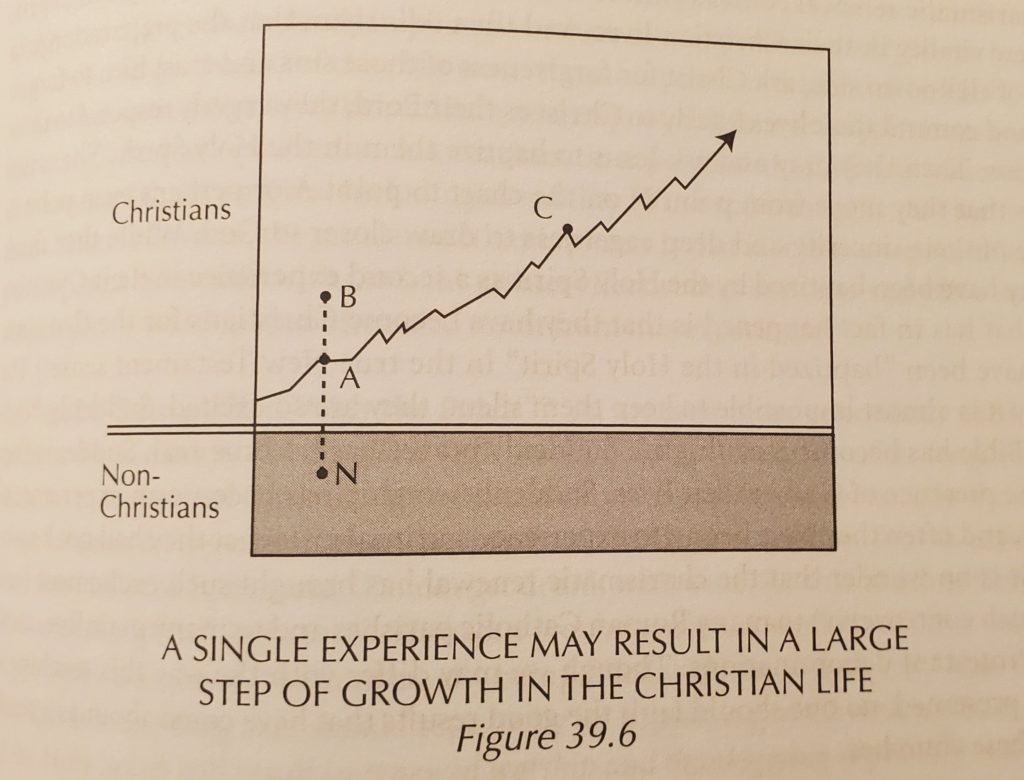Reading Systematic Theology with Wayne Grudem – Should we seek a “baptism in the Holy Spirit” after conversion? What does it mean to be filled with the Holy Spirit?
This post is part of a 50+ post series from the classic work by Wayne Grudem (PhD, Cambridge), Systematic Theology: An Introduction to Biblical Doctrine. The aim of each post is to provide an overview of each chapter in the book and related resources for each topic.
Synopsis of Chapter
In this chapter, Wayne Grudem covers the special works of the Holy Spirit. The topics of baptism of the Holy Spirit or being filled with the Holy Spirit have not been usually included in systematic theology textbooks. However, the growth of the Pentacostal and charismatic movements have driven more interest in this area – and it’s obvious the movement has affected the author as well.
Grudem reviews the two major views of the baptism of the Holy Spirit: the traditional Pentecostal view and the non-Pentecostal view. In addition, there are some practical ways for understanding experiences with the Holy Spirit after salvation. There are also helpful sections on speaking in tongues, understanding contemporary experiences with the Holy Spirit, and two-class Christianity.
Two Views on the Baptism of the Holy Spirit
There are two major views on what the baptism of the Holy Spirit is. The first view is the traditional Pentecostal understanding. In this view, believers receive the “baptism of the Holy Spirit” evidenced by gift of the Holy Spirit, especially speaking in tongues. There are several passages that point to this perspective, but it’s especially prevalent in the book of Acts. In Acts, there seems to be a strong tie between the gift of the Holy Spirit and speaking in tongues. Consider Luke’s account in Corinth, “And when Paul had laid his hands on them, the Holy Spirit came on them, and they began speaking in tongues and prophesying.” (Acts 19:6)
The other major view of the baptism of the Holy Spirit is the traditional, non-Pentecostal view. In this view, Jesus is the one who baptizes with the Holy Spirit and it happens around the same time as salvation. In the Pentecostal view, the baptism happens after salvation. In the non-Pentecostal view, the baptism happens at the time of salvation. Consider Paul’s words to the Corinthians: “For in one Spirit we were all baptized into one body—Jews or Greeks, slaves or free—and all were made to drink of one Spirit.” (1 Corinthians 12:13)
Problems in Two-Class Christianity
There can be issues in churches that teach some believers have the special gift of the Holy Spirit, while others do not. For instance, it may engender pride in those who think they have the gift while others do not have it. This can cause an unnecessary division in the body. This issue is similar to other types of two (and three) tier distinctions between various believers in other groups. Here are some non-biblical groupings of believers.
- Spirit-filled Christians
- Ordinary Christians
- Spiritual Christians
- Carnal Christians
- “Sanctified” Christians
- Ordinary Christians
- “Disciples”
- Ordinary Christians
- Saints
- Priests
- Ordinary Christians
How to Understand Contemporary Experience
Despite the disagreement between Pentecostal believers and non-Pentecostal believers on “baptism of the Holy Spirit,” there can be some agreement that the Holy Spirit is still at work in believers’ lives. There are times where the Holy Spirit will move upon a believer’s life giving him or her more spiritual maturity or insight. In Figure 39.6 below, this is Wayne Grudem’s visual representation on how a believer can grow over time, with periodic “jumps” in their spiritual journey.

A better way to understand these “growth spurts” in the lives of believers could be “being filled with the Holy Spirit.” The concept is found as a command in Ephesians 5:18 and it describes some believers in the book of Acts (Acts 4:8, 6:3). Being filled with the Holy Spirit is less about possessing the Holy Spirit, something that all Christians have, and more about having a greater measure of the Holy Spirit.
Application: Desiring More from God
One application from this chapter relates to what God has for each believer. Each Christian is sealed with the Holy Spirit (Ephesians 1:13), but not every Christian is “filled with the Holy Spirit.” Because this state is commanded (Ephesians 5:18), it seems reasonable we should seek more from God by his Holy Spirit. This would result in greater peace in the Christian life, greater power over sin, and greater effectiveness in ministry. May God grant us all the blessing of being more filled with God’s Holy Spirit.
For just as the body is one and has many members, and all the members of the body, though many, are one body, so it is with Christ. For in one Spirit we were all baptized into one body—Jews or Greeks, slaves or free—and all were made to drink of one Spirit.” (1 Corinthians 12:12-13)
Special Terms
- baptism by the Holy Spirit
- baptism in the Holy Spirit
- baptism with the Holy Spirit
- being filled with the Holy Spirit
- Pentecost
- new covenant experience of the Holy Spirit
- old covenant experience of the Holy Spirit
- two-class Christianity
Resources: Wayne Grudem
- Wayne Grudem: Book: Systematic Theology: An Introduction to Biblical Doctrine
- Wayne Grudem: 148 Lectures on Systematic Theology at Scottsdale Bible Church
- Wayne Grudem (Video: 1:08): What does it mean to be filled with the Holy Spirit?
Related Resources
- OpenBible.info: Verses on Baptism of the Holy Spirit
- OpenBible.info: Verses on Being Filled with the Holy Spirit
- John Piper: Be Filled with the Spirit
- Don Stewart: What Are the Results of Being Filled with the Spirit?
- Todd Wagner (Video: 9:46): What is the Baptism of the Holy Spirit?



